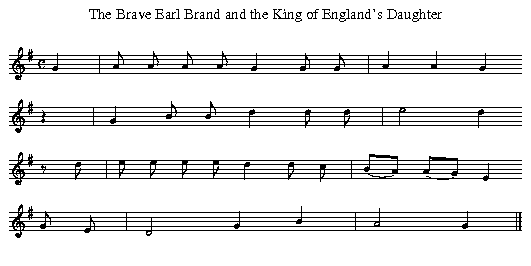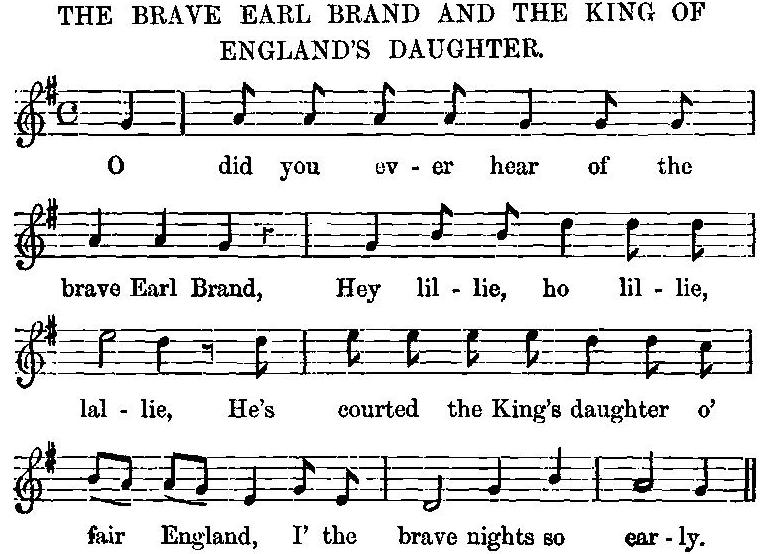The Brave Earl Brand And The King Of England's Daughter; Dixon, Child Ac
[This is Child Ac from Ancient Poems, Ballads and Songs of the Peasantry of England; taken down from oral recitation and transcribed from private manuscripts, rare broadsides and scarce publications; edited by Robert Bell, James Henry Dixon. Below is their text and sheet music,
R. Matteson 2011, 2018]

In 1846, the Percy Society issued to its members a volume entitled Ancient Poems, Ballads, and Songs of the Peasantry of England, edited by Mr. James Henry Dixon. Here from that volume is The Brave Earl Brand And The King Of England's Daughter:
(TRADITIONAL)
[This ballad, which resembles the Danish ballad of Ribolt, was taken down from the recitation of an old fiddler in Northumberland: in one verse there is an hiatus, owing to the failure of the reciter's memory. The refrain should be repeated in every verse.]
O, DID you ever hear of the brave Earl Brand,
Hey lillie, ho lillie lallie;
He's courted the king's daughter o' fair England,
I' the brave nights so early!
She was scarcely fifteen years that tide,
When sae boldly she came to his bed-side.
'O, Earl Brand, how fain wad I see
A pack of hounds let loose on the lea.'
'O, lady fair, I have no steed but one,
But thou shalt ride and I will run.'
'O, Earl Brand, but my father has two,
And thou shalt have the best of tho'.'
Now they have ridden o'er moss and moor,
And they have met neither rich nor poor;
Till at last they met with old Carl Hood,
He's aye for ill, and never for good.
'Now Earl Brand, an ye love me,
Slay this old Carl and gar him dee.'
'O, lady fair, but that would be sair,
To slay an auld Carl that wears grey hair
'My own lady fair, I'll not do that,
I'll pay him his fee. . . . . . .'
'O, where have ye ridden this lee lang day,
And where have ye stown this fair lady away?'
'I have not ridden this lee lang day,
Nor yet have I stown this lady away;
'For she is, I trow, my sick sister,
Whom I have been bringing fra' Winchester.'
'If she's been sick, and nigh to dead,
What makes her wear the ribbon so red?
'If she's been sick, and like to die,
What makes her wear the gold sae high?'
When came the Carl to the lady's yett,
He rudely, rudely rapped thereat.
'Now where is the lady of this hall?
'She's out with her maids a playing at the ball.'
'Ha, ha, ha! ye are all mista'en,
Ye may count your maidens owre again.
'I met her far beyond the lea
With the young Earl Brand his leman to be.'
Her father of his best men armed fifteen,
And they're ridden after them bidene.
The lady looked owre her left shoulder then,
Says, 'O Earl Brand we are both of us ta'en.'
'If they come on me one by one,
You may stand by till the tights be done;
'But if they come on me one and all,
You may stand by and see me fall.'
They came upon him one by one,
Till fourteen battles he has won;
And fourteen men he has them slain,
Each after each upon the plain.
But the fifteenth man behind stole round,
And dealt him a deep and a deadly wound.
Though he was wounded to the deid,
He set his lady on her steed.
They rode till they came to the river Doune,
And there they lighted to wash his wound.
'O, Earl Brand, I see your heart's blood!'
'It's nothing but the glent and my scarlet hood.'
They rode till they came to his mother's yett,
So faint and feebly he rapped thereat.
'O, my son's slain, he is falling to swoon,
And it's all for the sake of an English loon.'
'O, say not so, my dearest mother,
But marry her to my youngest brother—
'To a maiden true he'll give his hand,
Hey lillie, ho lillie lallie.
To the king's daughter o' fair England,
To a prize that was won by a slain brother's brand,
I' the brave nights so early!
The sheet music from Northumbrian Minstrelsy 1882:
